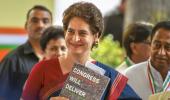For trust in democracy to be retained, elections need to be not just free of intervention -- ruling out Pakistan and Russia -- but also demonstrate the capability to both deliver ruling mandates and hold the potential for large swings in favour of the opposition, points out Mihir S Sharma.

Much has already been written about how 2024 is the year of elections. Four of the five largest countries in the world --India, the United States, Indonesia, and Pakistan -- will hold or have held elections.
The second-largest democratic election in the world, to the European Parliament, is also due to take place.
And there are yet more high-profile and highly visible elections in large or influential countries -- including Mexico, Russia, and the United Kingdom.
More than anything else, this is a reminder that "democracy" as a term conceals more than it reveals. These are all incredibly different elections.
Some, like Russia's, apparently have institutional processes identical to the rest of the world but are taking place under the shadow of an increasingly authoritarian State.
Others, like Pakistan's, may have been compromised by the intervention of a powerful extra-constitutional force.
In India, meanwhile, one side's dominance of both fundraising and the media makes it hard to argue that even free elections are completely fair.
But there is another divide that is worth considering: Between countries and blocs where the results are relatively predictable versus ones in which they are not -- or, in other words, countries and blocs that are capable of delivering clear mandates against those that are not.
In Indonesia, for example, Prabowo Subianto won 58 per cent of the vote in the presidential election held earlier this year, while his closest rival did not cross 25 per cent.
This certainly gives him a strong mandate to govern.
Even the most optimistic of their supporters, however, cannot easily argue that a similar mandate will be available for either Donald Trump or Joe Biden after November's election in the United States.
Perhaps the most likely scenario is that, once again, Mr Trump will be elected president but without winning the most votes.
The US has become increasingly dysfunctional at the federal level precisely because it now consistently fails to deliver emphatic mandates to its victors.
The most recent political polls for the United Kingdom, meanwhile, show the opposite.
The Labour Party is currently an almost unbelievable 28 points ahead.
If that were converted into seats, the ruling Conservatives -- objectively the world's most successful political party -- might be reduced to third or even fourth place in the incoming parliament.
Similar parties have vanished from the pages of history after that sort of wipeout.
The Tories are terrified of the spectre of Canada 1993, when the Progressive Conservatives -- who had ruled the country for much of the 1980s -- suffered a swing against them of 27 per cent and eventually dissolved as a political force.
Sir Keir Starmer, the Labour leader, is unlikely to have to worry about whether his mandate confers him with the authority to make major reforms.
The European Parliament is a particularly difficult case.
The European Union's (EU's) legislative body is, counter to much Eurosceptic propaganda, neither a rubber-stamp nor a talk-shop.
As negotiators for the free trade agreement between the EU and India know, the European Parliament's composition is quite important in terms of what concessions the Europeans can agree to.
But in spite of the major shifts in some member States' politics -- the electoral rise of the far right in France, Germany and Italy in particular -- the latest polls suggest that political trends cancel themselves out and the major centre-right and centre-left blocs may retain almost the same seats as they did in the last parliament.
While European elections are free, fair and representative, this effect is part of the reason why some in the continent continue to believe otherwise: They do not see large swings or unquestionable mandates in their legislative body.
And this leads us to one basic conclusion: for trust in democracy to be retained, elections need to be not just free of intervention -- ruling out Pakistan and Russia -- but also demonstrate the capability to both deliver ruling mandates and hold the potential for large swings in favour of the opposition.
In India, we certainly have come to expect, over the past decade, ruling mandates; but we are increasingly doubtful that large swings away from the ruling establishment are even possible.
Some have complained that this particular election season being particularly uninteresting, even boring, without the excitement and uncertainty that has attended past elections.
Framed thus, the complaint sounds glib. But it gets at a deeper truth: People in democracies need a sense of uncertainty in order to be convinced that their voice and their vote matter.
And, after an election is done, they need to see a mandate in order to go back to their lives and let their representatives get on with the business of government.
Feature Presentation: Aslam Hunani/Rediff.com











